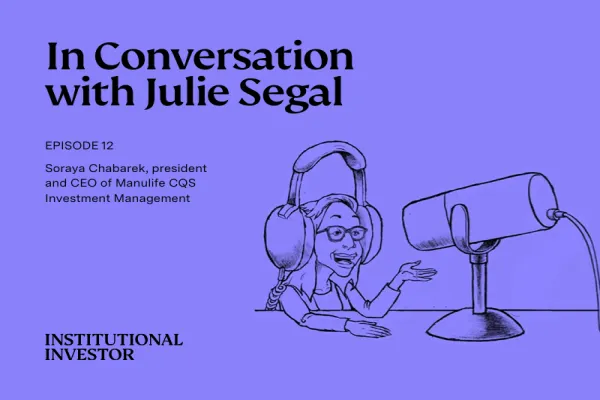The second day of the SALT Conference in Las Vegas lacked as many high-profile hedge fund managers as the opening day. However, it featured a rich, eclectic mix of investment ideas.
It also included high profile non-hedgies such as former Speaker of the House John Boehner, Shark Tank panelist and Dallas Mavericks owner Mark Cuban and a panel of political pundits, including Donna Brazile, who went at it with Karl Rove, especially over which party should be given credit for giving women and blacks the right to vote. Margaret Hoover was her usual thoughtful Republican pundit, who nonetheless continued her challenge to the party to become more appealing in the 21st century. Fun stuff, and at least this year - unlike last - it was on the record.
___
Perhaps the meatiest investment panel took place just before lunch, when a number of high-profile managers gave their favorite picks. The moderator, Omeed Malik, the global head of capital strategy at Bank of America Merrill Lynch, spiced it up by playing devil's advocate with each presentation. (He also started with a humorous case for why no one should listen to his own investment picks.)
The panel included Richard Chilton of New York-based Chilton Investment, who launched his hedge fund firm in 1992 and has been in the investment business for 36 years. Chilton made the case for a relatively staid, but reliable company, paint giant Sherwin Williams. Not exactly a FANG - Facebook, Amazon, Netflix and Google - stock or a leader of the disruptive economy. But, remember the goal is to make money, not to look hip and leading edge.
Chilton said he bought the company, which sells its paint in 4,000 stores, seven years ago at $69.71 per share. But its stock, he said, still has big potential over the next five to seven years. Sherin Williams has raised its dividend by 8 percent per year, he said, and in March announced it was buying competitor Valspar. "In five years, free cash flow will equal the purchase price of the deal," Chilton predicted. "The businesses are highly complementary."
___
On the same panel, John Lykouretzos of New York's Hoplite Capital Management made the case for shorting airlines, especially American Airlines Group. He asserted that contrary to widespread belief, the industry is not less cyclical and is not the oligopoly many believe. Labor will still be a big issue as will oil when prices start to rebound. And if the industry adds capacity, it will hurt itself.
He singled out American because he believes it is most exposed to rising oil prices. The reasons: American management is opposed to hedging oil prices. "It has weak free cash flow and the highest leverage," Lykouretzos said, adding that in November 2019 it will have to contribute $2 billion to its underfunded pension fund.
___
John Burbank III, founder of San Francisco's Passport Capital, presented an interesting pair trade for China. He is long Chinese Internet giant Tencent and short, as a hedge, an exchange-traded fund, iShares China Large-Cap. He told the audience this trade works no matter how the economic situation plays out in China. He said Tencent has been - and will continue to be - a strong performer and is equivalent to a so-called FANG stock in the U.S. Burbank says that at its current price the stock is trading at a big discount to comparable companies. It also owns stakes in other Internet companies. "Our numbers for Tencent for earnings are 30 percent higher than the Street," he said, noting the stock recently went sideways due to the overall China risk.
___
Jim Chanos, who has maintained a high profile these days, brought a fresh idea even though he spoke at the Sohn Investment Conference last week, where he presented separate investment ideas to the audience and in an interview on CNBC earlier in the day.
At SALT, he made the case for shorting hedge fund favorite Cheniere, the natural gas and liquefied natural-gas company. In fact, earlier in the day the company fired its chief executive officer, reportedly after it was pressured by Carl Icahn. "It sits on top of a complex holding-company structure," he said. Chanos has been arguing for some time that Cheniere will drown from its own debt in a very weak energy market yet trades twice that of less-leveraged competitors based on cash flow. "This is financial engineering gone crazy, skewed to the short side," Chanos said.
___
Of course, a hedge fund conference would not be complete without a panel on activist hedge funds. And SALT had its obligatory session. It included one familiar name, two who are growing in stature and one newish name. Jeffrey Smith of New York's Starboard Value was clearly the headliner. He is perhaps the busiest activist over the past few years and now has about $5 billion under management. Interestingly, the New York manager said that he has not engaged in a proxy fight since he won the right to replace the entire board of directors of Darden Restaurants in October 2014. Usually he has one per year. The reason: More firms are willing to compromise, whether over board positions, the sale of assets or some other agreed-upon remedy.
Smith declined to talk much about his highest-profile target, Yahoo!, where he and three other directors recently joined the board. However, he did address the fact that the Internet giant is looking to sell its core business instead of spinning off its Asia assets, which mostly include Alibaba, because of tax considerations. "If you look at the values, there is a lot of upside as related to difference in value where the stock is trading now minus the Asia assets," he said.
___
While discussing the possible dismissal of Yahoo! chief executive Marissa Mayer, discussion broke out over the virtues of large severance packages. Mayer reportedly stands to earn $55 million if she's fired. Smith declined to speak about her situation, but he stressed that these dollar values are more determined when the individual is hired rather than when they are dismissed or leave. He stressed it is up to the board to generally do a good job analyzing what is fair to attract someone new. "It is not easy," he stressed, noting that the gargantuan packages are usually fodder for media criticism. He said most CEOs are hired from within the organization. But, when boards look outside, they have to entice the individual. Candidate may have lots of unvested options or other benefits that they would be walking away from. "Sometimes it turns into situations that are expensive or sometimes they [the hiring companies] walk away because it is too expensive," he adds.
Scott Ferguson of New York-based Sachem Head Capital Management acknowledged that boards get uptight over the issue. But he asserted: "Sometimes severance is the best investment ever made if the company needs a CEO change."
His example: the change in CEO several years ago at Canadian Pacific, a major activist position at his previous firm, Pershing Square Capital Management. Outgoing CEO Hunter Harrison received $48 million. The stock was a huge performer after that. "It was a tremendous investment getting rid of him," Ferguson said. "No one is crying about the dollar amount paid."
___
When it came to singling out specific stocks, Ferguson talked about Team Health Holdings, which staffs hospital emergency rooms. It is already an activist target of Barry Rosenstein's New York-based Jana Partners. "Jana is on the board so if something could happen it will happen," he said.
Teresa Barger of Cartica Management positions herself as the only global emerging markets activist fund. She pointed out that 85 percent of all EM listed companies are controlled by a shareholder, family, founder or estate. "So our approach has to be different," she said.
Barger starts with country selection. For example, she is currently avoiding countries like Brazil where there is negative growth. Then she picks the companies. She looks for companies with good balance sheets where she is sure owners and founders really care about increasing their value.She singled out Voltronic Power, a Taiwanese supplier of products to the power market. She said the company has 52 percent of its assets in cash and pointed out to the company different ways it could boost its return on equity. "They said no one ever talked to them about this," she said.
___
Also on the activist panel, Cliff Robbins of Blue Harbour Group unveiled a new activist target. The Greenwich, Connecticut manager likes to call himself a friendly activist, having never launched a proxy fight, and says he takes a private equity approach to selecting investments. His new target is semiconductor maker Xilinx. "Its big tailwind is programmable cars," Robbins said. He says it is debt free and has $2 billion in net cash. He added that it has a very high return on invested capital and a very strong business and balance sheet but trades below its competitors.
___
Away from the hedge fund world, New York investor and former car czar Steve Rattner conducted an interview with former Speaker of the House John Boehner. The former Ohio Congressman made the case he had a pretty good relationship with President Obama, but that they were handcuffed in terms of what they could do. He also stressed that in the age of partisan cable networks, social media and other informational-dissemination vehicles, it has become hard to bridge partisanship. "There is no room to maneuver," he stressed.
But the liveliest part of the interview came when he trashed Ted Cruz and the obsessive "freedom caucus," which he repeatedly called "knuckleheads." "Shutting down government over Obamacare was the dumbest thing I ever saw," he said.
As for Donald Trump, Boehner said: "Trump is the presumptive nominee, like it or not. He worked hard to win delegates. Clearly he said a lot of things that some would be critical of on the left and right." He noted that Paul Ryan "is just being cautious" in dealing with Trump, but there is "no doubt there will be a meeting of the minds and things will be smoothed over."
Boehner also made clear he opposes a temporary ban on Muslims, building a wall at the Mexican border, tearing up trade agreements and not taking in Syrian refugees.






